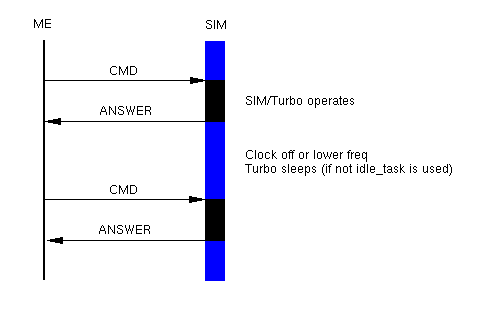
ME-SIM communication

ME-SIM communication
To turn on the idle task operation use the:
reg_action (ACTION_IDLE_TASK);
To turn the idle task operation off use the:
unreg_action (ACTION_IDLE_TASK);
Your turbo_handler() than should handle the ACTION_IDLE_TASK action, which application receives when Turbo enters idle state - APDU STATUS was performed and ME got its answer.
/* * Copyright (C) 2003 BLADOX, s.r.o. All rights reserved. * * This file is part of an example program for Turbo. This example * program may be used, distributed and modified without limitation. * */ #include <config.h> #include <turbo/turbo.h> #include <stdlib.h> u8 idle_on; u8 idle_pass; /* *INDENT-OFF* */ lc_char PROGMEM lc_Idle[]={ LC_EN("Test Idle") LC_END }; lc_char PROGMEM lc_Idle_Start[]={ LC_EN("Start") LC_END }; lc_char PROGMEM lc_Idle_Stop[]={ LC_EN("Stop") LC_END }; lc_char PROGMEM lc_Idle_State[]={ LC_EN("State") LC_END }; lc_char PROGMEM lc_Pass[]={ LC_EN("Pass: ") LC_END }; /* *INDENT-ON* */ SNodeP idle_n_start; SNodeP idle_n_stop; void test_idle_task () { idle_pass++; } u8 idle_ctx (SCtx * ctx, u8 action) { if (action == APP_ENTER) { if (idle_on) spider_append_r (ctx, &idle_n_stop); else spider_append_r (ctx, &idle_n_start); } else if (action == APP_LEAVE) { spider_clear_r (ctx); } return APP_OK; } u8 idle_toggle (SCtx * ctx, u8 action) { if (action == APP_ENTER) { idle_pass = 0; if (idle_on) { idle_on = 0; unreg_action (ACTION_IDLE_TASK); } else { idle_on = 1; reg_action (ACTION_IDLE_TASK); } return APP_BACK; } return APP_OK; } u8 idle_state (SCtx * ctx, u8 action) { if (action == APP_ENTER) { u8 *r = buf_B (); u8 *t; t = r; t = sprints (t, locale (lc_Pass)); t = sprinti (t, idle_pass); t = sprintc (t, '\0'); if (display_text (r, NULL) == APP_END) return APP_END; return APP_BACK; } return APP_OK; } SNodeP idle_n = { lc_Idle, idle_ctx }; SNodeP idle_n_start = { lc_Idle_Start, idle_toggle }; SNodeP idle_n_stop = { lc_Idle_Stop, idle_toggle }; SNodeP idle_n_state = { lc_Idle_State, idle_state }; SEdgeP idle_edges_p[] = { {&idle_n, &idle_n_state} , NULL }; void action_menu (void *data) { SCtx *c = spider_init (); c->n = &idle_n; c->eP = &idle_edges_p; spider (c); } void turbo_handler (u8 action, void *data) { switch (action) { case ACTION_APP_INIT: reg_action (ACTION_IDLE_TASK); idle_on = 1; idle_pass = 0; break; case ACTION_INSERT_MENU: insert_menu (locale (lc_Idle)); break; case ACTION_MENU_SELECTION: stk_thread (action_menu, data); break; case ACTION_IDLE_TASK: test_idle_task (); break; default: break; } }
The above example shows turning idle task on and off.
cli used)To perform STK command, memory card or SIM operation based on something that happened in the idle task, register the action ACTION_STATUS and use global variable to pass the flag.
If you want to have universal code that would work also in the idle task use the is_idle() to detect if your code is running the idle task or not.
|
|
Free imalloc'ed chunk.
|
|
|
Same as malloc but in temporary idle task memory.
|
|
|
Initiate idle malloc heap. It is freed automaticaly when idle task is aborted. |
|
|
Informs if you are in idle task. |
| Copyright © 2004-2006 BLADOX | Turbo version 1.2
|